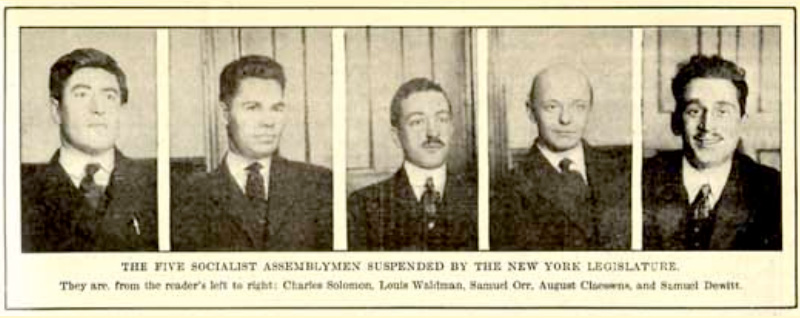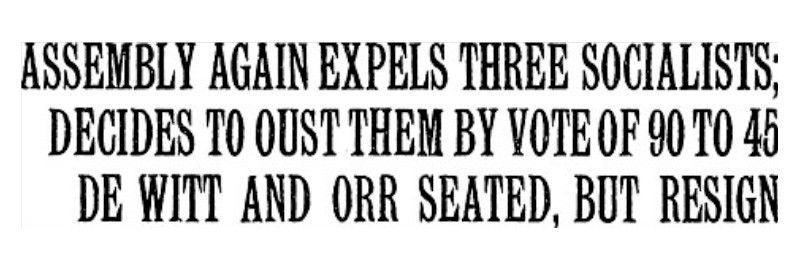Taking the wrong lessons from history
A reply to Liza Featherstone

The tradition of socialism is not a singular one. It is composed of different, sometimes conflicting, trends and sharp debates that bear both positive and negative lessons. The recent Jacobin article, “DSA Elected Are Carrying on the Socialist Tradition in New York”, by Liza Featherstone, connects the recent wins of DSA candidates for the New York State legislature to a wave of socialist candidates that won office one hundred years ago. According to Featherstone, it is in “these footsteps” that the recent DSA candidates are following. Unfortunately, the glowing historical comparison put forward by Featherstone deserves scrutiny. And for the emerging socialist movement of today, the lessons of that earlier period are largely negative—of what not to do.
In a general sense, we celebrate the election of socialists and fight against any undemocratic attempts to silence them or force them from office, which was exactly the fate of the New York socialists elected in 1919. Any time our side advances—whether via electoral or other means—the ruling class trembles and seeks to roll back these advances by whatever means they can. The question for our movement is how best to defend those advances.
Most of the individuals who won seats in 1919, including August Claessens, who authored the pamphlet quoted in the article, were on the right-wing of the Socialist Party. When the party split later that year, with the left-wing going on to form the Communist Party, they remained in the minority. Even then they were among the most conservative members of the party, as part of what was termed the Old Guard faction. What characterized their political tendency was the insistence on electoral politics being the primary vehicle for the Socialist Party, an allegiance to the trade union bureaucracy of the American Federation of Labor (AFL), and a disavowal of disruptive activity that risked breaking laws. After the split, they were sectarian in their refusal to work in united front campaigns with the then-larger Communist Party. This included rejecting joint work with the Communists in the South against the Klu Klux Klan in 1934.1 In the 1930’s the Old Guard would carry out a six-year factional campaign and left the Socialist Party to form the Social Democratic Federation.
Louis Waldman, who won a seat in 1919, was one of the primary leaders of the Old Guard. He was against any kind of “direct action,” which according to his memoir The Good Fight, included “[t]he general strike for political purposes, sabotage, the use of violence, the spread of fear, the paralysis of industry, trade, commerce, and even government.” His consistent zealotry for law-and-order would also apply to the civil rights movement, which he opposed on the basis that Martin Luther King Jr. advocated breaking the law.
Morris Hillquit, while not a winner in this specific election, is also mentioned as the lawyer for the five socialist Assemblymen and is quoted as the “last word” of the article. Hillquit, like Waldman and Claessens, was on the right of the Socialist Party and exemplified the focus on electoral politics rather than disruptive struggle. He had fought for this principled position in 1911 when “Big Bill” Haywood, then an organizer with the Industrial Workers of the World (IWW), was elected to the national leadership of the Socialist Party (by more votes than Hillquit). A year later Haywood had been purged from the leadership by Hillquit for refusing to denounce illegal action.2 It should be noted that this was decades before the Wagner Act, so unions themselves were “not legal.”
In 1919, the Hillquit leadership refused to recognize internal elections that would have put the left-wing of the party in the majority, and they went on to purge the left from the organization. “Let us clear the decks,” Hillquit wrote in an article from May 1919. Between May and August, Hillquit and the right-wing purged two-thirds of the Socialist Party, dropping their total membership from 110,000 to 35,000.3 The split that would form the Communist Party followed, and Socialist Party membership fell to 11,000 by 1922.

While this might all appear as a bunch of historical footnotes, it is worth mentioning because Featherstone’s article uses these historical figures to intervene in a current debate within the emerging socialist movement about the use of elections and the role of parliamentary struggle in the fight for socialism. When Featherstone argues that the lesson to be learned from that earlier experience is that their attempts to win substantial reforms were unsuccessful because “there were not enough Socialists in the Assembly”, is the lesson to just elect more socialists? Can socialism be voted in? Should the focus of socialist demands be strictly on bread-and-butter demands? Can the state be taken over by socialists via elections and wielded to carry out a fight against capital? Does the state need to be smashed and replaced with something different? These are important debates that have massive ramifications for socialist strategy. It is for that reason it is important to look at the historical examples and how they are used today.
While their victories in 1919 were driven by a broad radicalization around the idea of socialism, the majority of the figures who won seats in the NY State Assembly had a vision of socialist progress that was purely electoral in focus. It is that perspective that drove their election in 1919 and dozens of later campaigns throughout their political careers. Samuel Orr, for example, ran again the following year and won an Assembly seat. He was later appointed New York City Special Deputy Comptroller, and served for a decade in that position and later as a City magistrate. This was the primary focus of their political lives because their vision of socialism was that of the slow accumulation of electoral victories.
They expressed this quite plainly. In a 1921 pamphlet called “The Logic of Socialism,” Claessens laid out this vision in a section called “How We May Obtain Socialism.” In it, he describes socialism being won by the methods of “compensation, competition, taxation, and confiscation.” In this outline, socialists win a majority in legislatures and then take private property from capital by taxing them, buying industry from capital, creating government-run ventures that would compete with private industry, and in some cases confiscating industry. These methods would be carried out once we get “a majority of votes for Socialism.”

Hillquit too, in his 1919-1920 polemics against the Comintern and the left-wing in his party who supported the Russian Revolution, articulated that socialism would be obtained by “parliamentary majority rule.” In keeping with the right-wing’s consistent disavowal of revolution and illegal, disruptive action, Hillquit argued that the regime of private property could be wrenched from the tightly-held hands of the capitalist class without the “disarming, disenfranchisement, and outlawing of the bourgeoisie.” Rather, it was purely through the “means of the weapons and methods of political democracy” that socialism would be won.
Hillquit saw socialism, as Paul Heideman has pointed out, as “nothing more than the culmination of reforms.” He denounced revolution and instructed Socialist Party branches to “concentrate all activity on electoral ventures.” This is a key point. The political position of Hillquit and company, that Featherstone is so quick to praise, prioritized the electoral road over all others. The newly-formed Communist Party, focused on struggle but also used elections as a tool to further that struggle.
As a consequence of their positions, Hillquit and the Old Guard would remain isolated—focused purely on the electoral road—while the world turned upside down in a period of massive labor upsurge, fights against racism, and world revolutions.
It bears special mention that the right-wing of the Socialist Party’s excessive focus on elections meant downplaying struggles against anti-Black racism, including muting criticism of the segregated unionism of the AFL. As a result, many of the key Black cadre of the party’s Harlem Section left, and it would be the Communist Party, which (at least after 1919) had an explicit anti-racist orientation, that would play a pivotal, influential role in anti-racist struggle.4 Meanwhile, the Old Guard carried on in their way and got a City magistrate position out of it. I hope that these are not the footsteps to be followed by today’s socialist movement.
As a side note, in Featherstone’s article she focuses heavily on the socialist reforms that the Socialist Party representatives attempted to bring to the Assembly, like advocacy for public housing, pension, and public transport fare reductions, but there is an omission that is curious. Some historians, like Jacob Zumoff5, connect the expansion of membership in the Socialist Party that led to the 1919 electoral wins, to the anti-war position taken by the party through a weakened compromise between the left and right wings of the party in the St. Louis Manifesto. Hillquit himself received support for his 1917 mayoral campaign from none other than Helen Keller primarily because of his opposition to war and militarism. Though the war had ended a year before they were elected to office, Featherstone doesn’t mention this at all in the article, leaving her readers to assume that their popularity was based entirely on support for their bread-and-butter demands, rather than a principled anti-imperialism, or the raised expectations of the victorious Russian Revolution.
Finally, even on its own terms, the socialist victories of 1919 were limited. As Featherstone notes in her article, by 1920, members of the Republican and Democratic Parties had united to expel the Socialists from the Assembly. A narrow focus on electoral activity had left them without the forces necessary to fight back against the inevitable counter-attack from the mainstream parties.
It is a good thing that DSA candidates have won more seats in the NY State Legislature. However, I would hope we don’t follow in the footsteps of the past socialists’ efforts like those comrades in 1919. They consistently fought for an idea of socialism that flowed along the path of elections. They decried and purged those who thought that disruptive—and yes, sometimes illegal—extra-parliamentary struggles from below are essential to win socialism.
Examples like the early-twentieth century right-wing of the Socialist Party, or the current Jacobin fascination with the Milwaukee “sewer socialists” of the same time period, are not the beacons that we need to follow. Elections can be an important tool, but will not be the means for socialist transformation. Rather it is in building a movement that focuses on mass disruptive struggles from below, like those that have won every major working-class advance that has ever been wrestled from the greedy hands of the ruling class. We should build a movement whose goal is not to run the capitalist state but rather to destroy it.
- Robin D. G. Kelley, Hammer and Hoe (Chapel Hill, University of North Carolina Press; 1990) p. 120↩︎
- Jacob A. Zumoff, The Communist International and US Communism (Chicago, Haymarket; 2015), p.26↩︎
- Zumoff, p.37↩︎
- See Mark Solomon, The Cry was Unity: Communists and African Americans, 1917-1936 (Jackson, University of Mississippi Press; 1998), chp 1. & Philip Foner, Organized Labor & the Black Worker: 1619-1982, (Chicago, Haymarket; 2017), pg 162-163.↩︎
- Zumoff, p.27-28↩︎
Categories
We want to hear what you think. Contact us at editors@tempestmag.org. And if you've enjoyed what you've read, please consider donating to support our work:
Donatebrian bean View All
brian bean is a socialist organizer and writer based in Chicago, a member of the Tempest Collective, a part of the Rampant Magazine editorial collective, and an editor and contributor to the book Palestine: A Socialist Introduction from Haymarket Books.
